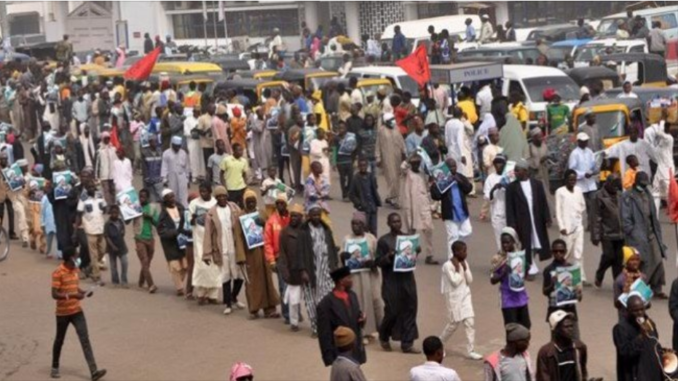
With no overriding push by the authorities to adopt global best practices in their engagements with the public, the police in Nigeria persist in their brutalities. In another repressive operation targeted at civil protesters in the Federal Capital Territory, Abuja, officers employed disproportionate force by firing teargas and live ammunition to disperse Shiite demonstrators recently. Officials of the rights watchdog, Amnesty International, verified the police shootings at the National Human Rights Commission headquarters in the FCT, where the protesters gather regularly. AI said bullets pierced and shattered windows in the building. This is reckless, heart-rending evidence that the police do not have any regard for human life in Nigeria.
The police have lost all respect for the right to assembly. It is regrettable that the colonial police mentality of treating demonstrators -and subjects writ large -as a population to occupy and oppress, not citizens to protect, still runs through the Nigeria Police today. The true responsibility lies not with rank-and-file officers but with those commanding them.
Governments and law enforcement agencies should abide by the United Nations Human Rights Cuba Convention, which advocates a range of means as broad as possible and equip law enforcement officials with various types of weapons and ammunition that would allow for a differentiated use of force and firearms. These, the Article says, should include the development of non-lethal incapacitating weapons for use in appropriate situations, with a view to increasingly restraining the application of means capable of causing death or injury to persons. The IG and the police top command should take a look at the document.
Right from the outset, anytime there is a whiff of protest against government policies, the police descend on protesters with maximum force. On the event in the FCT, AI said, “(The) Nigerian authorities must launch a thorough, impartial and effective investigation into the firing of live ammunition and tear gas at protesters, which caused damage and endangered the lives and property of staff of the NHRC in Maitama, Abuja…”
Police officers here embody brute force. The outcome is a long, bloody list of innocent victims of frivolous police shootings. Conveniently, they forget that, in a democracy, the constitution is supreme to their own archaic notion of law enforcement. Fundamentally, Nigeria’s 1999 Constitution, in sections 40 and 41, expressly guarantees these fundamental rights. Therefore, they are inalienable. Instead of deferring to this legal dictate, the police hark back to Gestapo tactics against protesters, which is indefensible.
In truth, nobody protests for the fun of it. For members of the Islamic Movement of Nigeria, they have been marching persistently against perceived injustices against them by the Nigerian state, since December 2015 when the military disrupted their procession in Zaria, Kaduna State. The death toll from the clash was reportedly in hundreds. The authorities have detained Shiite leader, Ibrahim el-Zakzaky, his wife and some of his family members since then. Their continued detention is the legitimate ground for the Shiites’ protests.
Across the world, such protests are perceived by the police as an integral part of constitutional democracy. Annually, placard-carrying protesters swoop on the World Economic Forum summits at Davos, Switzerland, in remonstration against the perceived ills of capitalism. With their helmets and other protective gear, the police keep the dissenting voices at bay. For months in 2019, protesters marched on the streets of Hong Kong to demand greater freedom. The main weapons of the police were water cannons and batons. In South Korea, protests are commonplace. It is a culture much beloved by its citizens.
However, the contrary is the case in Nigeria. At every turn, the police brutally put down protests; not minding that human life is sacrosanct, protesters bear the full brunt of police recklessness. On numerous occasions, the Shiites have suffered unmitigated losses from police excesses. Before last week’s impunity, there was another provocative incident in July 2019 in which six fatalities were recorded from police bullets. In October 2018, the IMN claimed police shot dead another 40 of their members on the outskirts of the FCT, though the official death toll was six. Shockingly, the culprits often walk free.
At other times, police callously shoot at protesters. In Lagos during the protests against the arbitrary increment in petrol price in 2012, a young boy playing street football was brutally shot dead. In the military era, students on protest marches were shot dead at universities in Lagos, Ibadan and Ife.
For the average citizen, the police are their worst enemies. On the road, officers threaten and bully innocent motorists. A carryover from the repressive era of the British colonialists, it is unfortunate that nothing has really changed more than a century later. Illogically, officers demonstrate their sense of barbarism by brandishing weapons when on traffic control duty. This is asinine as there is no correlation between traffic control and the use of AK 47 assault rifles. The Inspector-General of Police, Mohammed Adamu, should put an end to this immediately.
The lesson from the United Kingdom is that the police fired their guns only seven times in the year to March 2016. In 2014/15, the police forces fired their guns six times and four in 2013/14, says the UK Home Office. The Austrian Interior Ministry stated that the police used firearms on criminals only four times in 2010 and 2011 each. The Norwegian Police Service records state that no death was recorded from police shooting between 2007 and 2014 with just one death each in 2005 and 2006. The police in Japan record similarly low use of their firearms.
These are the best practices the Nigeria Police should emulate, instead of demonstrating servitude to the government of the day by offering protection to only pro-government demonstrators. To elevate policing in Nigeria to these admirable standards, a new orientation for all categories of officers, especially the junior officers, is unavoidable. New, decent, humane and civil rules of engagement need to be swiftly implemented.
END

Be the first to comment